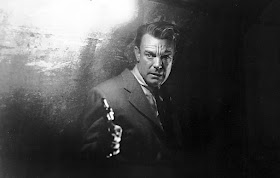There was something insubstantial
about Dennis O’Keefe. He starred in a slew of film noirs—more than almost any
other leading man, in fact—but the impression he made didn’t go very deep. That
probably sounds like a tougher criticism than I mean it to be. O’Keefe was
rarely ever bad in a film, and in films like RAW DEAL and ABANDONED he stepped
up and delivered strong performances, but most of the time he was more of a
sturdy workhorse than a star player.
Look at a film like CHICAGO
SYNDICATE. Here O’Keefe plays an accountant named Barry Amsterdam who is
recruited by the cops to infiltrate the criminal empire which has sprung up in
the wake of Al Capone’s arrest and conviction. This new syndicate is run by a
powerful behind the scenes player named Arnie Valent (played smoothly by Paul
Stewart). Since the gangster recently let his accountant go, at the end of a
gun no less, Amsterdam works his way into the organization, impresses Valent,
and starts to gain his trust. He also meets two women hovering around Valent.
One is a singer named Connie Peters (Abbe Lane), the kind of washed-up showgirl
who’s a couple of days past her expiration date and doesn’t know it yet. The
other woman is a mysterious gambler named Sue Morton (Allison Hayes) who may
not be what she seems. Neither woman likes Amsterdam very much, but Valent
takes an immediate shine to him. Soon the soft-spoken gangster is entrusting
Amsterdam with his private books, offering him a cut of the proceeds, and even
taking him to the old neighborhood to meet his devoted mother.
Most of this is pretty standard
fare, albeit done well. Director Fred F. Sears was a journeyman director and
bit-part actor who churned out a lot of low budget westerns and the occasional
crime flick (he directed O’Keefe in INSIDE DETROIT). Alas, he’s also the man
who gave us the camp classic TEEN-AGE CRIME WAVE, so he could go bad when he
had weak material. Here, though, he moves scenes at a brisk pace, and he ends
the film with a chase that’s actually quite well done. O’Keefe and Stewart have
a shootout that extends through a factory, down into some tunnels beneath the
city, and ends in the old neighborhood right under Mama Valent’s window—it’s a
beautifully shot sequence with some nice twists and turns.
Still the script feels like a rush
job. As Valent, Paul Stewart probably gives the film’s best performance, but
his character isn’t allowed any real breakthrough moment. Stewart started out
on the stage with Orson Welles in New York and moved to Hollywood for CITIZEN
KANE. His aura as an actor was an almost lethargic sleaziness, as if he
couldn’t be bothered by the pretense of decency. CHICAGO SYNDICATE seems to set
up his character for an emotional showdown with Amsterdam—after all, in their
relationship, Valent is the honest one—but the film never does anything with
this. Likewise, as his washed up girlfriend, Abbe Lane works hard, but her part
is so underwritten that a later scene in which she’s tortured lacks the power
that it should have.
At the center of it all is Dennis O’Keefe,
sturdy and bland. He had a classic fifties face, suspicious of emotion but
weakened by booze and cigarettes. He’d started out in films as an extra in the
early thirties, and he’d stayed in the business for the better part of forever
without ever really becoming a star. CHICAGO SYNDICATE was well over the two
hundredth movie of his career, and like a lot of people on the B-list in the
fifties his days in features were numbered. The studio system was starting to
break up, and with it died the classic B-movie. O’Keefe found himself on
television where he had a short lived comedy series costarring Hope Emerson.
His legacy in film comes down to the glut of crime flicks he made in the
forties and fifties, and yet even in noir he never achieved the following of
someone like Robert Mitchum or Sterling Hayden. In truth, he lacked Mitchum’s
style or Hayden’s glorious artlessness. What O’Keefe had was a professional’s
consistency. It wasn’t a sexy quality, but it got the job done.

No comments:
Post a Comment